Vacuum Forming
Vacuum Forming
Blog Article

Vacuum forming is a widely used plastic molding technique that involves heating a thermoplastic sheet until it becomes soft, then using vacuum pressure to shape it over a pre-formed mold.
Vacuum Forming Procedure
To create a vacuum-formed product, the plastic sheet is first placed into a frame and heated until it becomes flexible. Once the material is ready, it is laid over a template, and a vacuum is applied to draw the material tightly over the mold, ensuring the desired shape.
After forming, the material is cooled to retain its shape. The final product is then trimmed to remove unwanted material and prepared for use.
Industries Using Vacuum Forming
Vacuum forming finds its uses in sectors such as aerospace for creating customized plastic parts. Some typical products made using vacuum forming include:
- Car dashboards
- Clamshell containers
- Medical device casings
- Point-of-sale stands
Why Choose Vacuum Forming?
One of the biggest advantages of vacuum forming is its low production cost. Other key benefits include:
- Quick turnaround
- Affordable molds
- Flexibility in design
- Lightweight materials
Conclusion
Vacuum forming is a effective process that facilitates the creation of custom plastic products at a low cost.
Vacuum Forming Report this page